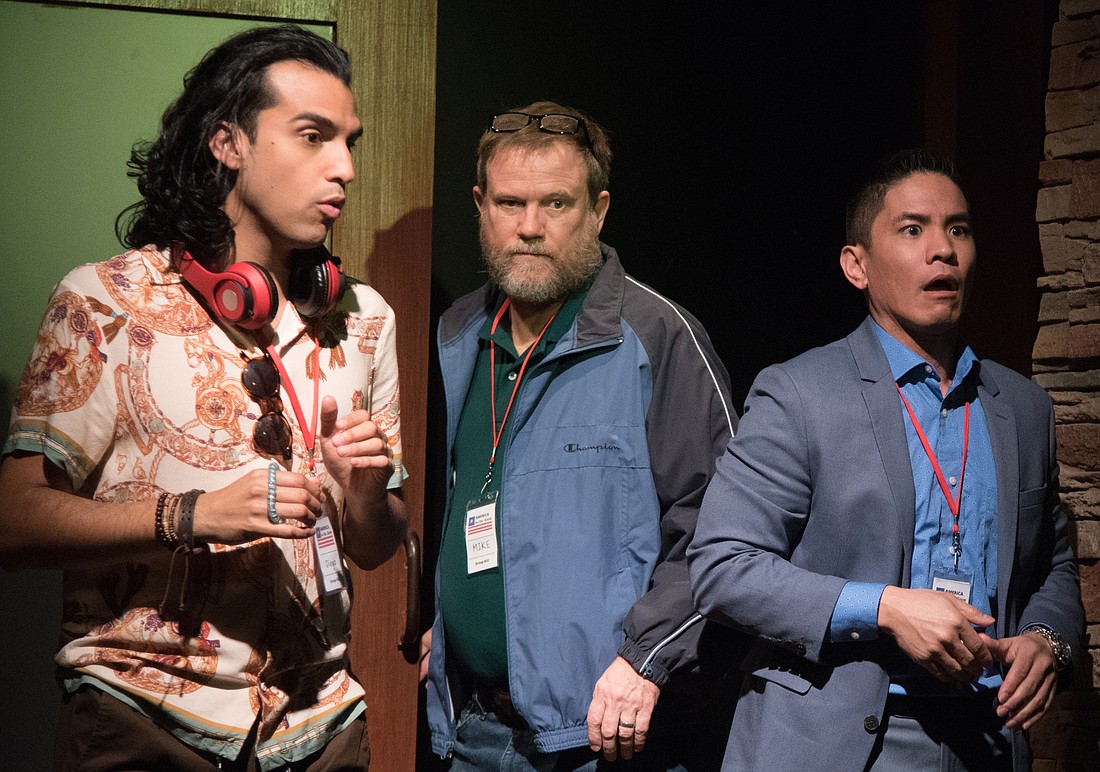- April 18, 2024
-
-
Loading

Loading

Jason Odell Williams is an award-winning playwright and Emmy-nominated television producer based in New York City. His plays like “Church & State” and “Handle with Care” explore both the political and the personal.
His latest play, “America in One Room,” does both. It’s now on stage at Florida Studio Theatre. Williams created this reality-based drama in 2020 during the summer of social distancing as part of FST’s Playwrights Project.
Where did he get your idea? Writers are used to that question. They usually give the same answer…
Ideas are everywhere. There’s a constant stream on TV, snippets of conversation, dreams, the radio, the Internet or the newspaper.
Getting an idea is the easy part. Finding a good idea is not so easy.
The trick is noticing when a good one passes by. Where did Williams snag the flash of inspiration for his latest play?
“I got it from a news story in The New York Times,” he says. “Not a front-page article. It was buried in the back of the news section.”
According to Williams, that article was about an event called America in One Room.
A nonprofit, nonpartisan group was behind the experiment.
In September 2019, they gathered more than 500 people from all across the country and put them in one hotel room in Texas.
The participants came from all walks of life and all political affiliations: Democrats, Republicans, and everyone in-between. They got them in one room and divided them into big groups and small groups to talk about the big issues.
And talk across party lines.
The theory: If you put a diverse array of people in a room and get them talking to each other, you could change the polarized dynamic of contemporary America.
“It had to be real talk, not people yelling at each other on Twitter, not quoting sound bites back and forth,” says Williams. “It had to be a real conversation, with real answers to honest questions. Why do you think that? Why do you vote that way? What issues are the most important to you?”
The organizers got the people talking about their deepest concerns.
A bold experiment. That didn’t immediately work.
At the beginning of the week, it felt like the participants’ ideas were planted in the ground and nobody would budge. By the end of the week, it felt like there was much more wiggle room, more give-and-take. More people started seeing things from the other person’s point of view and it wasn’t contentious.
“The experiment finally did work,” Williams says. “It showed that peoples’ hearts and minds can change. That captured my imagination.”
Williams adds that America’s contemporary political landscape can seem hopelessly divided. Like a deadlocked shouting match.
With no possibility of change or real dialogue.
“If you’re on one side, that’s it; if you’re on the other side, that’s it,” he says. “You’ve got to pick sides. And you won’t even talk to the people on the other side.”
Williams saw this experiment as a glimpse of hope. It grabbed his attention. And he instantly saw the dramatic potential.
“I thought this news story would be a great jumping-off point for a play,” he says. “But ‘America in One Room’ is still a fictionalized version of the actual events. For this story to work on stage, I had to make it interesting. The reality was just a room with people talking. So I had to invent some dramatic conflict.”
After a long gestation, Williams’ reimagining of America’s one-room dialogue is finally on one stage. The playwright says he was “thrilled” to see a fully staged performance of his new play in front of a packed house at FST. What would he like to see next?
“My corny hope with this play is that it will go on to get produced all across the country and start conversations and make America a little less divided," says Williams. "A little more united. And maybe even a little happier. At least until they turn on the news again!”